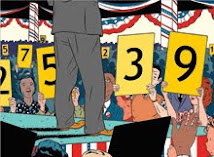Greenwald didn't see any answers from colleagues either. Rachael Maddow and Joan Walsh's best ideas were to give tough love for Obama only until the election year started. Then they recommend a level of unconditional positive regard that even Carl Rogers couldn't strive to.
But there is a tool to remove the eat-shit-and-smile approach of the Left's base. It's called Approval Voting. Approval Voting is a lot like Plurality--the system we're accustomed to. The only difference is that instead of being limited to one vote, you can vote for as many as you wish. But that's a bigger deal than it may sound on the surface.
Let's look at the dynamics of the political situation first. That will help us understand the problems we're dealing with. Imagine yourself as a leftie back in 2000. The candidates Gore, Bush, and Nader are important to you. You crap yourself thinking of Bush getting elected (and indeed you will). And Gore is not exactly your knight in shinning armor. He doesn't support gay marriage, he's for the death penalty, for the war on drugs, supports cap and trade rather than a carbon tax, supported NAFTA, against single-payer, and he supported strikes on Iraq. Nader, on the other hand, is your wet dream on policy issues.
And so you have your quadrennial dilemma. You can be a frustrated pragmatist and vote for Gore; or, you can keep your integrity by voting for Nader. Of course, a Nader vote risks that you crap your pants with Bush.
But the picture is worse than this. The Left wouldn't think of describing Gore's drawbacks, just as they've been hesitant to call out Obama on his weaknesses when he ran. Instead, the Left makes excuses for the Democrat candidate. The Left becomes a collection of apologists. It even tells its political teammates to shut up on the Democrat's flaws. Indeed, this can continue even when the Democratic candidate gets elected. There is some loose tolerance mid-season, but it's back to a strict no-criticism policy once election time returns.
And yet, the picture is still worse. The Left is so afraid of Republicans that it will actually marginalize the candidates it agrees with most. The picture above is tame compared to the treatment the Left gives Nader. And when the Left marginalizes its more appealing candidates, it also marginalizes the ideas those candidates bring. Those ideas become easier to attack because they're only supported by "fringe" candidates. Single-payer health care and opposition to wars immediately come to mind. The polls of actual support for those policies aren't typically raised at this point. Besides, the Left doesn't want the Democrat to appear weak for not supporting those policies.
All this also translates into weak polling results. And the Commission on Presidential Debates requires an average of 15% over five national polls in order to participate in the debates. The political dynamic makes polling at this level a virtual impossibility. This is why you only see the Republican and Democrat in the debates. [perfect book on the debates here
So how does Plurality Voting create all this mess? Voting consists of two parts: the expression and the calculation. The calculation part is easy--just add 'em up. No issue there. The problem is with the expression. Plurality only lets you express the minimum amount possible. Your say is limited to one candidate, and you don't get to say how much you like that candidate. And that limit to one candidate is why third-party candidates appear as fringe. Plurality prohibits voters from saying anything about the other candidates. In reality, however, the number of voters that actually support those alternate candidates is significantly greater. And it's the voters that do support those third-party candidates that wind up splitting the vote. It's here that we get our spoiler problems.
Approval Voting offers to change the current political dynamic substantially. The calculation in Approval Voting is exactly the same as Plurality. The only difference is the voter's directions. It's as simple as the depiction above. If anything, Approval Voting is easier than Plurality because Approval voters are less likely to spoil their ballot. That makes sense because voters must make their Approval ballot unreadable in order to spoil it. And this is no problem for voting machines either--not that this is an endorsement of voting machines. The point is that Approval Voting is easy, maybe even easier than Plurality.
Because Approval Voting lets voters choose more than one candidate, this eliminates vote splitting and thus the spoiler effect. So you like Nader but still don't want Bush to win? Then use your Approval vote for both Nader and Gore. They each get one vote added to their tally. And you won't want to abandon voting for Gore until it's clear that either Bush isn't in the running or Gore himself is no longer competitive. You can think of it as voting like you would under Plurality given the polls, but then you continue as you wish. The good part is that Approval Voting always lets you vote for your favorite. [more on strategy here]
So that's nice. Approval Voting eliminates spoilers. But what does Approval Voting do for the potency of the partisan voter? The reason voters on the Left have no power is because Democrats don't have to listen to their policy concerns. But Approval Voting allows those policy concerns to gain ground. Approval Voting legitimizes those policies of the Left by giving third-party candidates a more accurate level of support. Indeed, large-scale French studies contrasting voting systems show significantly more support for third-party candidates when Approval Voting is used. This result has been consistently repeated.
So no more of that 1-2% of the vote nonsense for legitimate third parties and independents. It's also difficult to marginalize third-party candidates when they're polling over 30% or 40%. Under Approval Voting, a Democrat that ignores third-party issues now risks losing the race. Approval Voting has it so that even when the Democrat does win, the Left still gets what it wants. That's because the Democrat can't ignore the Left's issues anymore. At the very least, those issues will have to be included in the political dialogue. And higher poll numbers for third-party candidates will make it nearly impossible to exclude the candidates from debates. This legitimization of ideas and candidates is the power Approval Voting gives the partisan voter. And the Left should be clamoring for it.
[Technical notes:
- Instant Runoff Voting (IRV) won't solve your problems. True, IRV does mitigate vote splitting with fringe spoilers. But it fails when candidates become competitive. IRV splits the votes of popular centrist candidates. The popular centrist has its votes split by competitors from either side of the political spectrum. This vote splitting occurs because there is only one first-choice vote. The popular centrist candidate then gets eliminated by having the least first choice votes. Visual here.
- Also, IRV is a nonmonotic system. This means scenarios arise when you can hurt your candidate by voting for them and help them by voting against them. Specifically, this craziness happens about 15% of the time with IRV elections. This rate doubles to about 30% when IRV picks a winner other than the Plurality winner. Also, IRV doesn't let you vote your favorite, as was seen in the Burlington, VT election.
- Approval Voting (as a form of Score Voting), escapes Arrow's Impossibility Theorem because it is a cardinal system.
- Approval Voting does not regress to Plurality through bullet voting.]















